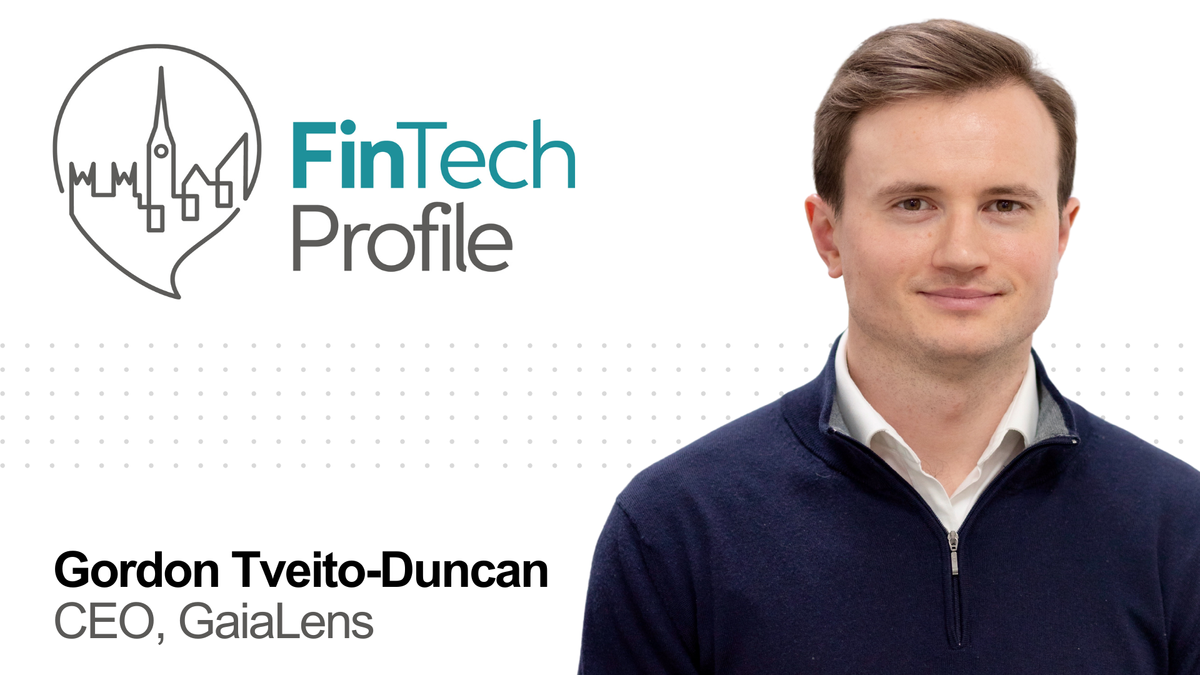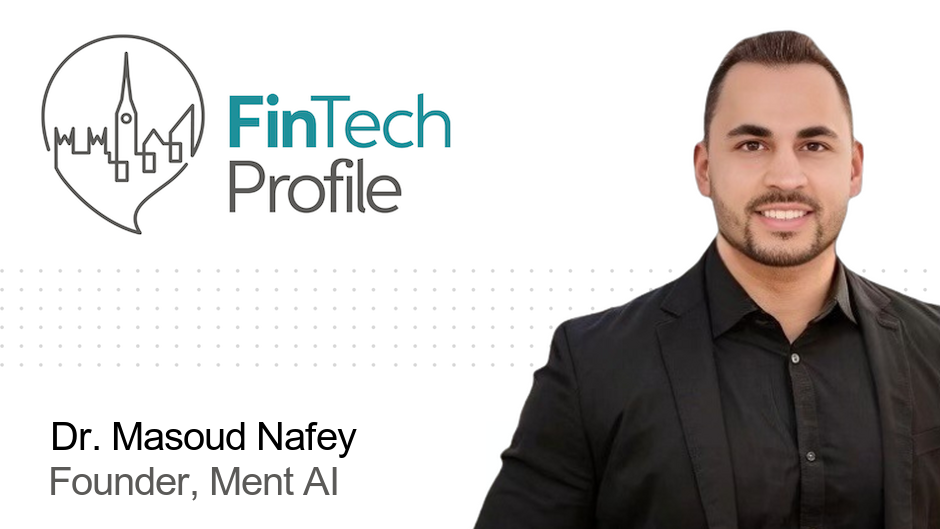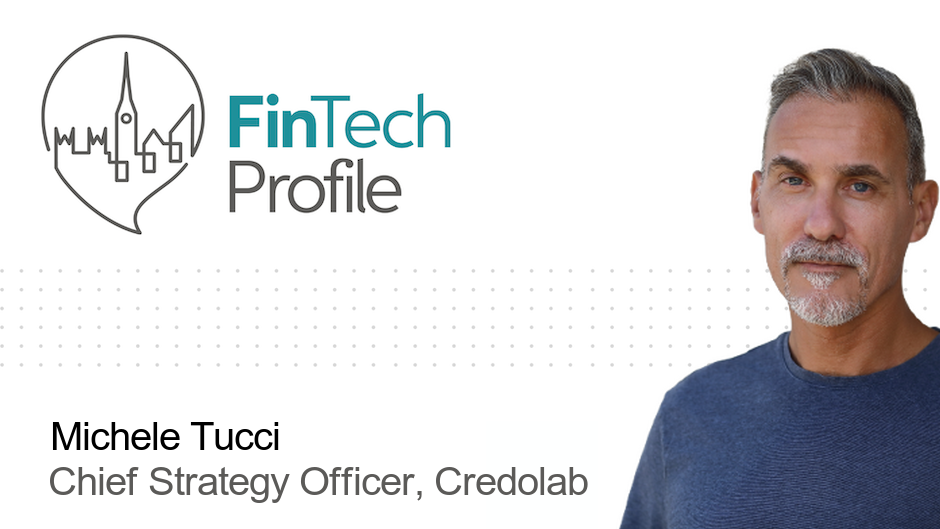Gordon Tveito-Duncan, CEO, GaiaLens

Today we're meeting Gordon Tveito-Duncan, CEO of GaiaLens. The company specialises in AI-powered sustainability analytics for institutional investors and financial services companies.
Over to you Gordon - my questions are in bold:
Who are you and what's your background?
I am the CEO and Co-Founder of GaiaLens, an AI-powered sustainability analytics platform. I have always considered myself a generalist, having a background in finance and technology, and felt for a few years before starting working on GaiaLens in 2020 that the way that I can have the most impact on the world would be running a FinTech business where I can bring together both finance and technology people. I am passionate about the intersection of finance, technology, and sustainability, so I consider GaiaLens the perfect business for me to start.
I began experimenting with different business ideas before I started my MSc in Data Science at City, University of London, in 2019. For most of my adult life, I did not have the confidence to start my own business and believed that I did not have the necessary skills or experience.
However, the year before City University, I spent a year working at a data science consultancy start-up run by an impressive young founder. Working with him showed me that it was possible to start a business at a relatively young age and inspired me to start working on an idea I had been thinking about for a while.
My first serious business idea was WealthAware, a personal finance app designed to automate portfolio tracking across many different assets and platforms for retail investors. Once I started at City University, I dedicated as much time as possible to WealthAware and entered a student entrepreneurship competition where I won £5,000. This gave me some confidence that perhaps I could successfully start a business. However, WealthAware was then superseded by GaiaLens…
What is your job title and what are your general responsibilities? (To give us an idea of what you do at the company on a daily basis.)
As the CEO of GaiaLens, my primary responsibilities are heading up Product, Sales and Marketing.
As the Head of Product, I manage a tech team of 10 people, including data scientists, data engineers, and software engineers. I own and manage the product roadmap, balancing the priorities of client projects and our long-term product strategy. I also manage and architect our technology stack.
As the Head of Sales and Marketing, I lead our go-to-market strategy, including monthly thought leadership pieces, digital marketing, and outbound sales. I also lead the sales team and sales processes. Regarding Marketing, I oversee our brand guidelines, messaging, and marketing materials.
Can you give us an overview of your business?
GaiaLens, launched in 2021, is an AI-powered sustainability analytics platform for institutional investors and financial services companies. Our platform acts as a digital ESG analyst, supporting investors throughout the entire ESG investment lifecycle and saving them significant time.
The GaiaLens platform comprises a suite of tools to help investors fulfil their ESG needs, including portfolio reporting, investment screening, ESG compliance and deep-dive research capabilities.
At its core, GaiaLens is a data-driven product that compiles and analyses structured and unstructured data sets, as well as traditional financial data sets, to ensure that all ESG-relevant data on over 22,000 companies are gathered, measured for consistency and transparency, and scored in real-time across the E, S, and G pillars. We handle equity and debt securities and have environmental data on more than 3.5 million private companies.
The GaiaLens platform can also integrate and process data not currently in our system, such as data from private companies, real estate assets and infrastructure investments. We are ESG data experts and can easily handle new data, which can then be used to calculate ESG scores and presented on our sustainability analytics platform.Asset Manager Use Case
Our platform helps Asset Managers with four main use cases:
- ESG Research: The GaiaLens sustainability analytics platform saves analysts time researching companies’ ESG performance. The highest quality and most up-to-date ESG data is instantly available at their fingertips for over 22,000 companies.
- Portfolio Benchmarking: The platform enables users to upload a portfolio and compare its ESG performance to a benchmark in seconds. Users can then instantaneously generate detailed sustainability reports, including UN SDGs, EU Taxonomy, TCFD, and SFDR reports.
- Portfolio Controversy Detection: Our best-in-class Controversy Detection System processes articles and tweets using a sophisticated large language model (LLM). The LLM generates controversy scores for the ESG pillars and a greenwashing controversy score. Users can subscribe to our controversies alerts, which will alert them when a controversy affects one of their portfolio holdings.
- Greenwashing Risk: We combine the Portfolio Benchmarking and Controversy Detection workflows to assess a portfolio's or fund's greenwashing risk. If a fund makes sustainability claims, its investments must align with those goals. We can use GaiaLens scores, climate metrics, and controversies to assess the fund's greenwashing risk.
Asset Owners Use Case
Our platform helps Asset Owners with three main use cases:
- Allocation-level Aggregation: The GaiaLens platform calculates the overall sustainability performance at the very highest level of aggregation across all portfolios/funds and asset classes.
- Controversy Monitoring: Users can subscribe to our Controversy Detection System, which will alert them when a controversy affects one of their investments. Users receive one consolidated email per day covering all their investments.
- Greenwashing Risk: Our award-winning Greenwashing Analytics Solution helps asset owners mitigate their greenwashing risk. If a fund makes sustainability claims, its investments must align with its sustainability goals. We can use GaiaLens scores, climate metrics, and controversies to assess the fund's greenwashing risk.
Our platform differentiators are:
- End-to-end SFDR Reporting: GaiaLens offers an automated, comprehensive, end-to-end SFDR reporting solution. Users can upload historical holdings, generate reports exactly like those in Annex 1, and compare Impact (year n) to Impact (n-1).
- Controversy Alerts: Users can subscribe to our Controversy Detection System, which will alert them when a controversy affects one of their portfolio holdings.
- PDF Analysis: Our users can upload any PDF, such as company annual reports, and use the GaiaLens PDF GenAI Chatbot to extract the latest carbon emissions numbers or analyse trends over time. This powerful tool can answer questions like “How has the company improved its carbon footprint according to the report?”
- Impact Screens: We offer customisable impact screens that quantitatively assess a portfolio or fund against a benchmark. The screens are presented intuitively and engagingly.
- Greenwashing Analysis: We have a Company greenwashing screen and a Fund greenwashing screen.
- Company Greenwashing screen: The company greenwashing screen looks at companies’ targets, press releases and other communications and compares them to quantitative data like reported emissions and our controversies output, which flags each time a company has been accused of greenwashing in the news.
- Fund Greenwashing Screen: To assess the fund's greenwashing risk, we can use GaiaLens scores, climate metrics, and controversies.
- Modular Platform: The GaiaLens platform is fully modularised. All of the above differentiators are modules, and you can subscribe to them individually or bundle them—pay for what you use!
Tell us how you are funded?
We have raised two investment rounds from angel investors and institutional investors.
What's the origin story? Why did you start the company? To solve what problems?
During my MSc Data Science in London, I started learning more about the ESG space and became good friends with Seb (the other GaiaLens Co-Founder), who was also doing the course – we had fortuitously sat next to each other during one of the first lectures.
We were initially introduced to ESG investing while attending a presentation given by a fund manager. We saw the opportunity to apply the latest Data Science techniques to this area and decided to focus our dissertations on it.
Our Masters’ dissertations involved applying state-of-the-art data machine learning algorithms to ESG data. We became fascinated by the space and the challenge of making sense of unstandardised, messy and sparse ESG data and researched more about the downfalls of existing ESG data providers.
After finishing our Masters’ degrees in October 2020, we worked to commercialise our work and build a proof of concept. This was successful, and then we raised a seed round in April 2021 and officially launched GaiaLens!
Who are your target customers? What's your revenue model?
We have a subscription-based revenue model where our clients purchase a licence for each user of our products. We have three main product offerings:
- GaiaLens Sustainability Analytics Platform - empowering investors across the ESG lifecycle
- GaiaLens Data - Real-time ESG Scores, Proprietary ESG Factors, & News
- GaiaLens OD (on-demand) - our two self-serve products, GL Report and GL Chat. GL Report is a fully automated comprehensive sustainability reporting tool that saves ESG analysts 10 hours per report on average. GL Chat is a PDF GenAI chatbot that saves analysts 240 hours throughout the year compared to manually searching through company/fund reports.
We offer GaiaLens OD to ESG analysts working at small/medium asset managers in the UK and Europe.
We offer our full sustainability analytics platform to asset owners.
If you had a magic wand, what one thing would you change in the banking and/or FinTech sector?
I would make banks more open to working with FinTech startups. It is very challenging to sell to banks as a startup, and it often takes up to a year just to agree upon a trial.
What is your message for the larger players in the Financial Services marketplace?
AI is, of course, the biggest trend affecting business currently, and I am sure that C-suites at large financial services companies are scrambling to figure out their AI strategy. With this context, my message to them would be that it may be quicker and cheaper to partner with FinTech startups that are AI-native to implement AI throughout their organisations rather than to try to do it all in-house.
Where do you get your Financial Services/FinTech industry news from?
FinTech by Sifted, The Daily Upside, WSJ, Finimize
Can you list 3 people you rate from the FinTech and/or Financial Services sector that we should be following on LinkedIn, and why?
- Barney Hussey-Yeo - Founder & CEO at Cleo (here is a great podcast)
- Nikolay Storonsky, CEO, Revolut (podcast)
- TS Anil, CEO, Monzo (podcast)
What FinTech services (and/or apps) do you personally use?
I use Chase as my primary bank and Monzo as my second bank. I use Nutmeg and Vanguard as my main investment platforms.
What's the best new FinTech product or service you've seen recently? Autopilot. I haven't personally used it yet, but I have been seeing a lot of people talking about the Pelosi Tracker and the Inverse Cramer Tracker, which look like fun ways to invest and make decent returns.
Finally, let's talk predictions. What trends do you think are going to define the next few years in the FinTech sector?
I am interested in seeing how AI affects the FinTech sector. I am excited about the prospect of new consumer FinTech products that are AI-native, taking inspiration from Cleo. I think there is huge potential in using LLMs to build consumer finance apps to help people budget, save and invest - imagine your own personal AI finance assistant that knows everything about you and can help you make the best financial decisions with respect to your goals! Taking this even further with AI agents, you could have AI agents actually taking actions on your behalf, like rebalancing your investment portfolio.
Importantly, I also think that LLMs can help bring financial education to the masses.
I am also really interested to see if neo-banks like Starling, Monzo, and Revolut can build on their amazing success so far, take significant market share from the high-street banks, and become people’s primary bank accounts.
Thank you very much Gordon!
Read more about Gordon on LinkedIn and find out more about GaiaLens at www.gaialens.com.




